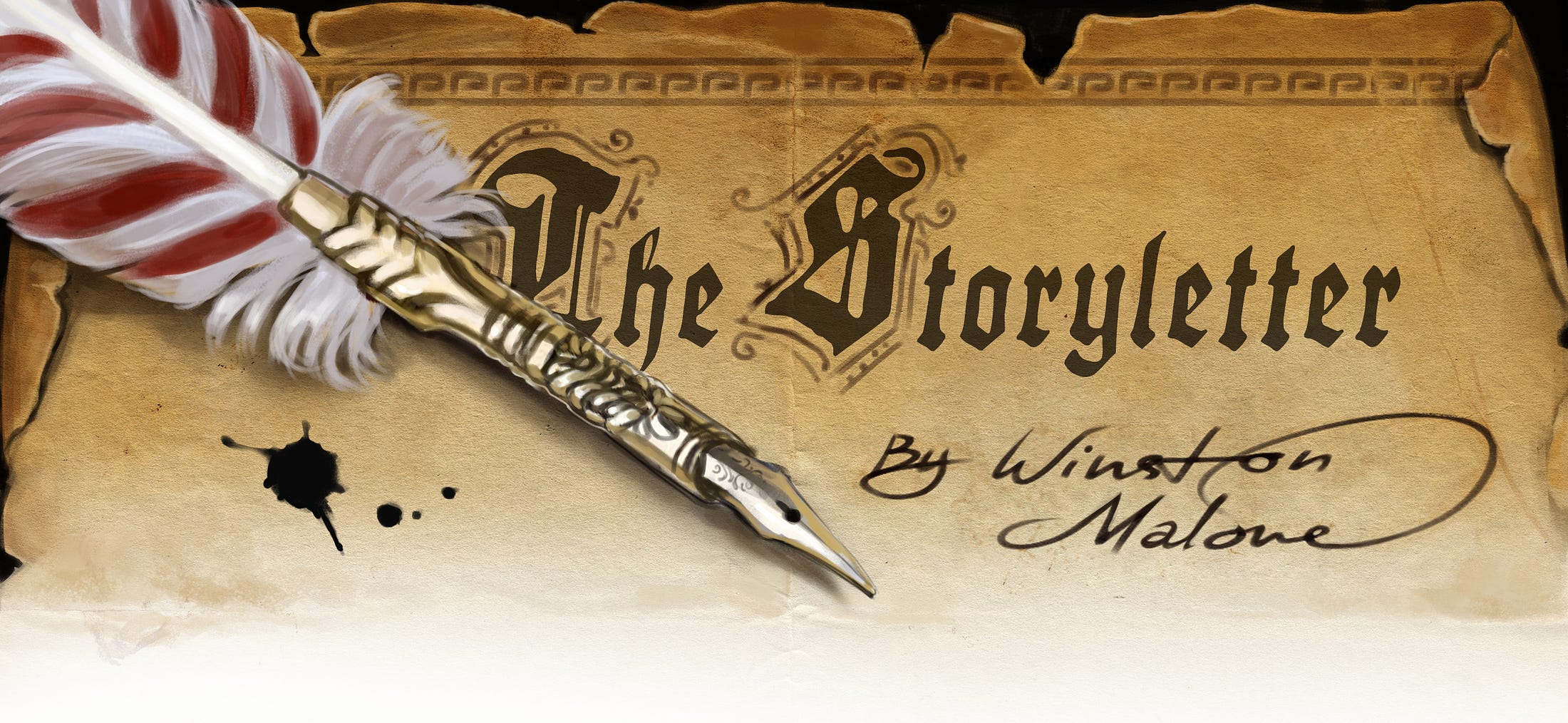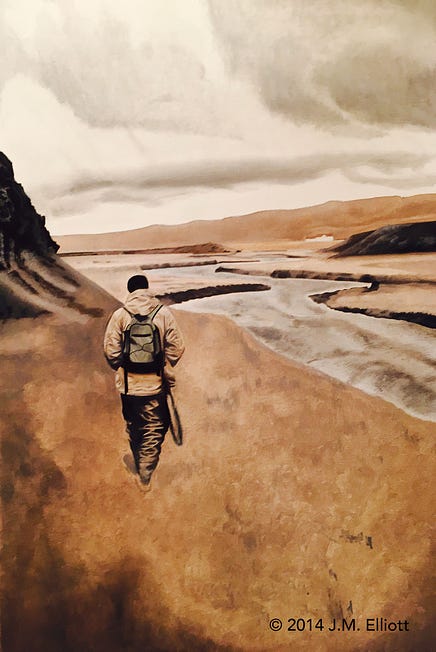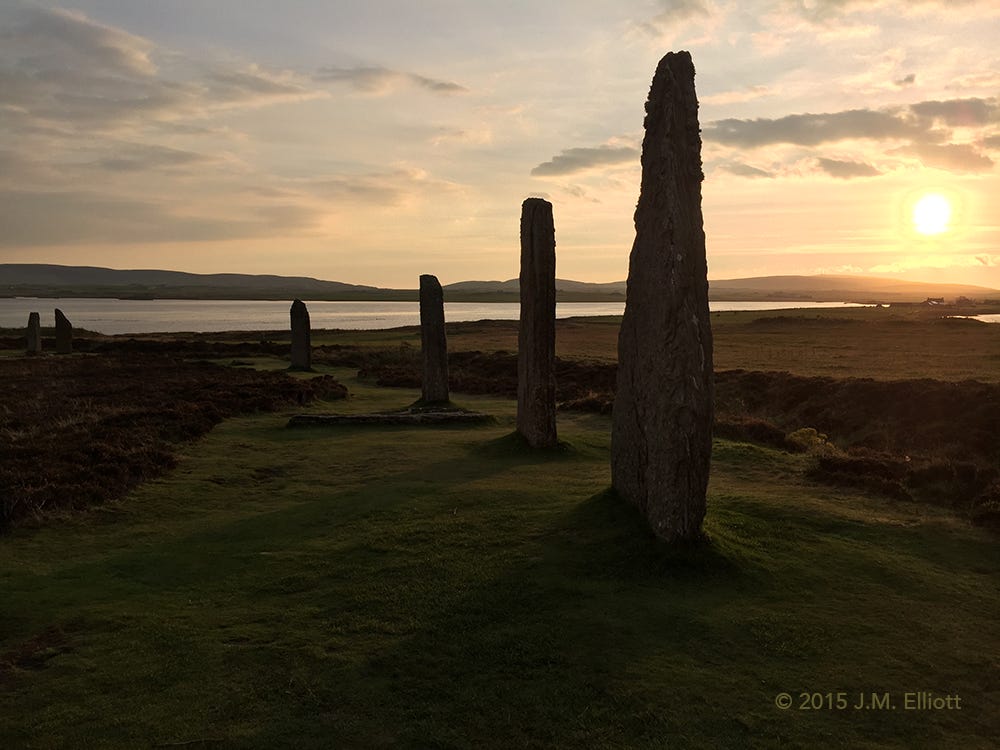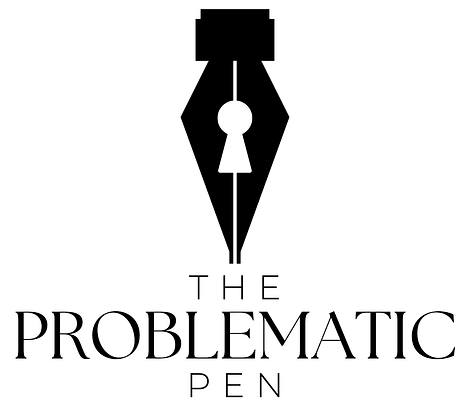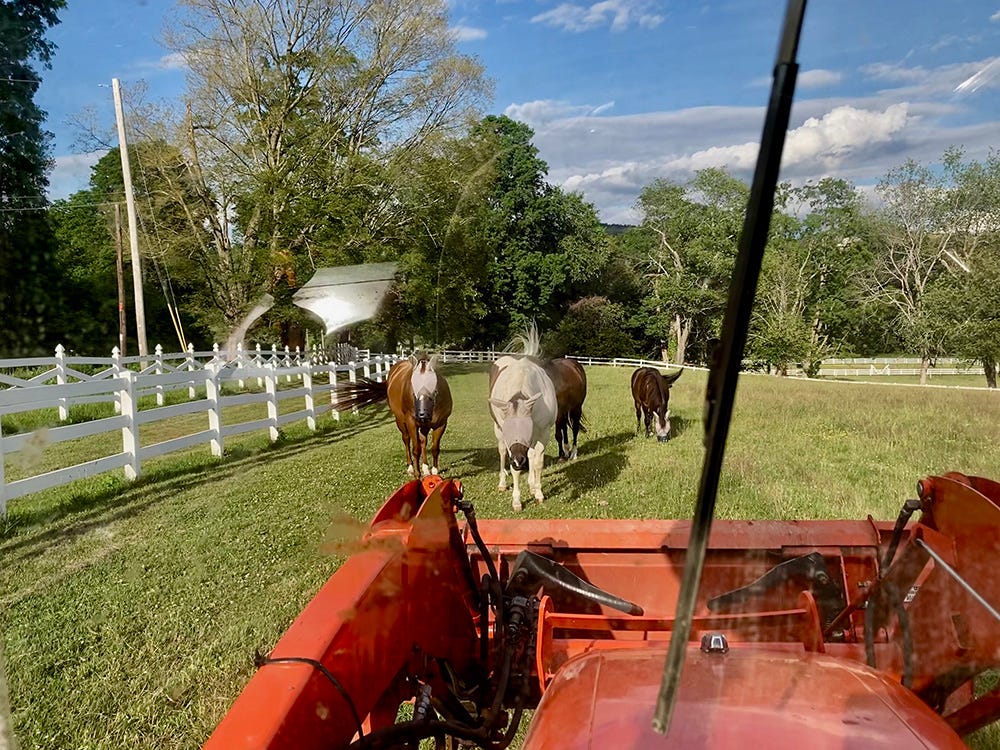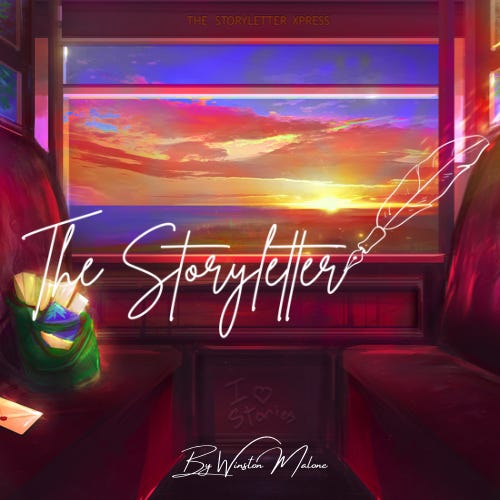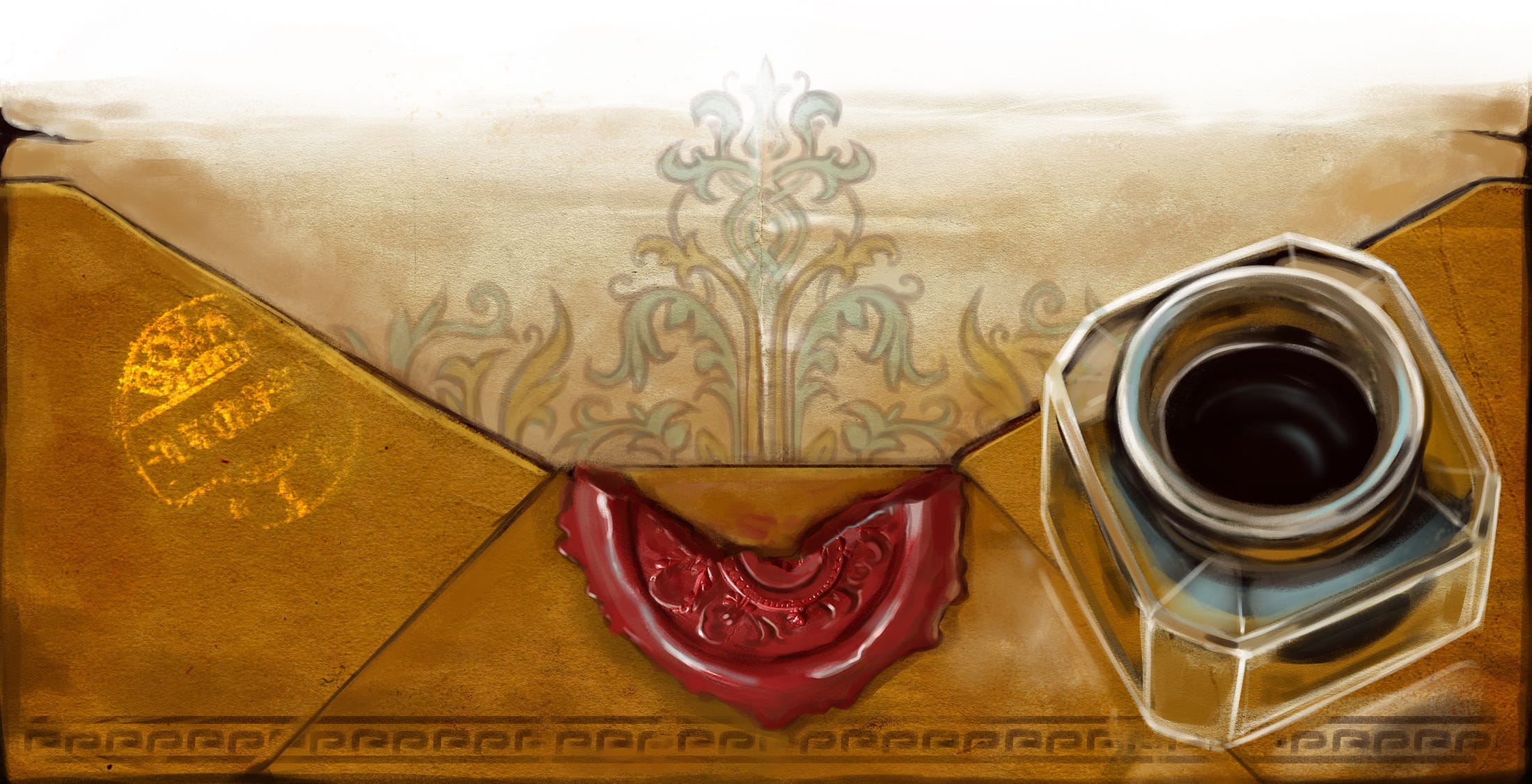The Storyletter - Interview with J.M. Elliott
Dear Reader, I’m very excited to share this guest interview with you. I’ve learned so much by speaking with J.M. Elliott over the past year in our Substack thread discussions. It was only natural that I’d reach out and interview Jacquie in order to learn more about her and her writing. J.M. Elliott is a historical fiction writer, and author of the forthcoming Steppe Saga trilogy. Her first novel, Of Wind and Wolves, is currently being serialized on her Substack called The Problematic Pen. J.M. Elliott also writes poetry, short fiction, and compelling pieces on culture (past and present). Hey Jacquie, let’s start from the beginning. When did you start writing? Was there a specific catalyst, or had you always gravitated toward the arts even as a youth?I never considered myself a “writer” in the usual sense, and I don’t recall ever wanting to become one. I liked to draw when I was a kid, though I never took any classes. However, I briefly took painting lessons at a local art studio—just long enough to learn the basic techniques of preparing a canvas, mixing colors, and cleaning brushes. The artist liked me and let me assist with evening and weekend classes to help pay for my lessons and art supplies until things got tight and she couldn’t afford an assistant anymore. When she started to pay me in astrology readings, I had to bail. I kept experimenting with painting on my own, but it was always just a hobby. Writing has begun to fill the time I would normally dedicate to art. But, for someone who always preferred the outdoors, life as a writer would have seemed like a curse. I never did see the romance in it that others seem to. I know that probably sounds like sacrilege, but there it is. A friend dragged me to a college friend’s dinner party in NYC years ago when I was in my late teens-early 20s. The only thing I remember about it was that everyone there gave unsolicited introductions of themselves as artists or writers—as in: Hello, I’m Mia; I’m a writer. It was bizarre. All I could think was, “bitch, please, you wait tables”. At the time, I was working at different stables mucking horse stalls. My friend was mortified when they asked me what I did and I told them I shoveled shit. They did, too; they just didn’t own it yet. I guess the joke is on me now because I write and make art professionally for my day job, and I consider myself lucky. But, I only began writing fiction about 10 years ago when I started what would become my historical trilogy. I realize that sounds insane because it is. Who makes a novel—a trilogy, no less—their first attempt at creative writing? But for some reason, this story got stuck in my head, and I had to write it down. It might never have happened, except I had to spend a few days sitting in a hospital bed with electrodes glued to my head getting a video EEG, and I had nothing to do but mess around on my laptop. I’d been fascinated with an event I read about in Herodotus, and I became intrigued by this one song I listened to on repeat. The two combusted, and the outlines of a story started to take shape. I wrote a few scenes every day while waiting for the test to be over. That’s when I started writing fiction. And those first scenes I wrote are still some of my favorites. What began as one book proliferated into three; many years and revisions later, I’m still tinkering with it. You’ve mentioned to me before that your background is in anthropology and archaeology. Did you go to school for these studies? What drives your passion for history?My family used to make cross-country road trips all the time when I was a kid. It was great because I got to see most of the US states at ground level. One of the places we’d visit was Arizona because we had family there, and when I was about seven, we went to the Grand Canyon and Painted Desert. Of those two stunning landscapes, the one that has stuck with me to this day is the Painted Desert because that was where I saw my first ruins and petroglyphs. I was filled with questions. Who built these houses, and where did they go? Who carved these mysterious images, and what did they mean? They flipped a switch in my mind about human history and culture; from that day on, I needed to know more. My dad is also interested in archaeology, and he started giving me books on the subject—ancient Egyptians, Sumerians, Mayans, and Aztecs. I read everything I could find. I think I love the past—and ancient history especially—because it’s the ultimate mystery story. We find these clues—fragments of artwork, jewelry, trash, weapons, household items, bones, buildings—and from them, we try to reassemble a puzzle and get a picture of the people who left these traces behind. They resonate with us because they’re part of our collective story—our human family scrapbook and photo album. Being naïve and idealistic about the inner workings of academia, I thought it would be a cool profession to go into. I loved what I studied, but the more I learned about the politics of academia—in every sense of the word—the more I realized it just wasn’t going to be for me. But I like to play armchair anthropologist, and I still volunteer for archaeological digs on occasion, which in retrospect, gives me the best of all possible worlds. You’re writing a historical fiction novel called “Of Wind and Wolves”, serialized here on Substack. Could you give us an overview of what it is, and the origins of how it came about?Sure, Of Wind and Wolves is the first volume in the historical Steppe Saga trilogy set on the ancient Pontic Steppe (present-day Ukraine) in the 5th C. BCE. It takes place among nomadic horse tribes known as Scythians, whose female warriors were probably the inspiration for Greek myths about Amazons. One of these “Amazons” is betrothed to the Scythian king to secure an important alliance for her tribe. But, by law, Amazons can’t marry until they’ve killed an enemy in battle, so she’s sent into the wilderness with the Scythian warband to fulfill this requirement. Only, she doesn’t really want to marry, and she begins to like her life of freedom. So she tries to figure out how she can stay with the warband—be a warrior—without ever actually having to kill. In a violent world, is such a thing even possible? Will the other warriors accept her abstinence? Will she have to resort to deception? And, for what might she break her moratorium on killing? The trilogy is essentially one continuous narrative that I wrote simultaneously. It broadly explores the dramatic events related by Herodotus in Book IV of The Histories involving the historical Scythian King Ariapeithes and the struggle for succession between his three sons. Each of the books is founded upon one of the three Scythian origin myths related by Herodotus. (Spoilers ahead)According to Herodotus, when King Ariapeithes is murdered [Vol II], his half-Greek son Scyles ascends the throne. His preferences for Hellenistic practices become apparent and meet with the disapproval of the people. A coup is mounted by one of the rival princes [Vol III], and Scyles is executed by his brother, who then assumes the throne. In this Greek version of events, Herodotus casts Scyles, the Hellenic prince, as a tragic hero and victim of Scythian xenophobia, like the Scythian sage Anacharsis who suffered a similar fate. Was Scyles a visionary trying to civilize his barbarous society? Or was he the agent of a colonial regime seeking to impose a foreign culture on an unwilling native population? These are the sort of subjective questions we still grapple with today, which are often best viewed through the prism of fiction. I liked the idea of telling the story from the barbarian perspective for once. Rather than reducing barbarians to caricatures of savagery and lust or casting them as foils for “civilized” heroes—as rubes or rogues in desperate need of instruction or comeuppance—the books aim to reveal the humanity of the individuals on the other side of the classical gaze. “The Problematic Pen” is a clever name for a newsletter. In my view, writing is meant to challenge the reader, not pander. How do you think the future of writing online is going to evolve? Did you choose Substack for its apparent commitment to free speech?Thanks! I couldn’t agree more about challenging readers, though I have my doubts whether the rest of the internet would agree with us. I’m honestly not sure where the future of online writing is going. I see some…I’ll call them “entrepreneurial” writers who seem to want to take online fiction in a particularly mercenary direction that makes me uncomfortable, but that’s how these things go. How well undiscovered indie writers manage to compete in this landscape is yet to be seen. But I’m cautiously optimistic. So far, I think Substack is a net positive for indie writers and I hope it continues to be. I initially heard about Substack because some journalists whose work I respected had migrated here, and I subscribed to their newsletters. It was then I learned about its supposed commitment to free speech and decided to try posting my work here. We’ll see how Free Speech vs. Substack’s Profits shakes out in the end. No, they don’t employ an algorithm, but they certainly keep a balance sheet, and they like to further the cause of whatever’s making them piles of money, not necessarily what promotes their stated principles. Which is fine. But I suspect that’s what ultimately decides fates here on the platform. Meet the new boss, same as the old boss? So far it seems alright, but free speech isn’t always popular, so I’ll be curious to see how things play out. Why did you choose to serialize your novel rather than self-publish on a service like Amazon?I could offer some high-minded answer about democratizing literature and whatnot, and that’s all true, but my reasons were mainly practical. I thought it would be a methodical, manageable way to revise each chapter one last time while also putting the book “out there” where I could hopefully get some feedback before I commit it to print. It’s difficult to objectively judge your work, and it’s easy to miss mistakes and inconsistencies when you stare at it relentlessly for months or years (I’m still missing errors!). Also, it’s incredibly daunting to put something you alone made into the world, and serializing online feels like more of a soft launch. I’m so grateful that readers have already offered thoughtful and valuable feedback and suggestions that have helped me improve my work. Thank you to everyone who has been reading! What are your future goals for writing and publishing? Would you still go the traditional route if someone were interested in picking it up?When the last chapters of Of Wind and Wolves are up on Substack, I hope to compile a version for print and eBook formats. I haven’t decided which method yet, as I am trying to think long-term about how best to offer the series. If I self-publish, I might consider starting a small publishing company, in which case, I’ll have some questions for you! As far as traditional publishing goes, I never say never, but I can’t imagine any scenario where I go the traditional route today. My experience with my former agent, submissions to editors, and subsequent queries left a bad taste. I would need to retain a lot of creative freedom over my work (i.e., I’m not interested in having the Inquisition scour my writing for the latest heresies), and I’d need to know that they’d support me in the event that a bunch of pitchforking zealots on Twitter got their shorts in a twist over something in the book or on my Substack. The industry just doesn’t have the stones for heterodox literature and authors anymore—not unless your books make them Harry Potter money. Everyone else has to live like literary fugitives. Screw that. How do you manage your time between farm life, your work, and your hobbies?Well, on any farm, the animals have to come first. Weather and care of the horses dictate a lot of my life, so I work around both! Then my job takes priority, obviously, or the bills don’t get paid. After that, I ride and tackle chores around the farm and garden. Having a full-time job and a farm to manage is a lot, but I still make time to enjoy my other interests and hobbies. Whatever time I have left, usually in the evening, I try to dedicate to writing, though sometimes I have to shut my brain off and veg out in front of the tv. If I’m going to the office, I can get some writing in during my drive using a pilot’s kneeboard, where I take notes that I later transcribe. Most of my trilogy was written this way, in my car during my commute. Weekends are for all that and everything else. I’m not familiar with a lot of fictional works set in ancient times that aren’t outright fantasy novels. Do you have any recommendations for writers toying with the idea of writing a historical fiction story?Writing historical fiction is part of a long, influential tradition and the creative possibilities are endless. The most challenging and rewarding aspect of writing it—especially fiction set in the distant past—is trying to get into the headspace of people from another era. The biggest misconception about the past is that people were just like us with a few details askew. They were not. When L.P. Hartley said, “The past is a foreign country,” it was a practical, humane way to examine history. Exploring the past is like learning about or visiting a distant culture. The traditions, beliefs, customs—almost everything about how people lived and thought may be alien to us. We can approach it with suspicion, judgement, and hostility or with openness, curiosity, and sympathy. The same broadminded approach that makes one a good traveler can also help make one a good writer of historical fiction—or any genre, really. Then, you have to become an ambassador for the past. It’s the author’s job to understand, translate, and represent the “foreign” historical perspective to modern readers without injecting too many present preferences, idioms, or ideologies, bringing the past to life in an authentic, understandable, and engaging way that neither patronizes the reader nor misuses the subject. In other words, it’s a balancing act, but a fascinating and worthwhile one. Do you have any advice for early or independent writers?I would just say: don’t use writing—or any creative pursuit, really—to fill a need in yourself for validation, recognition, renown, fame, respect, love…. Writing itself can’t earn you those things, and it will undoubtedly earn you the opposite many times over in the form of criticism and rejection. Yes, some writers gain fame, prestige, and wealth, and you might be one of them. But write because you love it, want to challenge yourself, need to satisfy some curiosity within you, or have something you want to express, etc.. You don’t need the approval or acclaim of others to do these things, and when validation for your efforts comes from within, you’ll be free to write how and what you want, for its own sake. If others praise it, great. If they don’t, your original creative impulse is untouched. Isn’t that what being an independent writer is all about? How do you overcome the fear of public scrutiny?There’s a lot of evidence to suggest that what we like and dislike is determined unconsciously, irrationally, and is only later rationalized by the conscious mind. Unless someone out there has telepathic powers we’re not aware of, we literally have no control over how other people think or why—and neither do they. So, I sift criticism for useful, constructive information, but I don’t let anyone’s dislikes (or likes) affect me personally. Instead, I focus on the things I do have control over, namely myself and my work. The Stoics, and Marcus Aurelius in particular, had an interesting perspective on staying above the fray:
That seems to me like something worth striving for, both in life and art. That’s the end of our interview with J.M. Elliott. We hope you enjoyed it. Please like and share this with friends and family. Feel free to ask J.M. Elliott any questions here in the comments or on her Substack, she’ll be happy to answer them. Thanks for reading! ~ WM You’re a free subscriber to The Storyletter. For the full experience, become a paying subscriber. Thanks for reading! Until next Storyletter ~ WM |
Older messages
To Build a Contest
Monday, October 24, 2022
XPress Access | October Edition
Why join as a paying subscriber?
Wednesday, October 19, 2022
XPress and First Class Explained
All Hallows' Eve | Featuring "Kindling"
Wednesday, October 19, 2022
October 2022 Newsletter
The Summer Light
Sunday, October 16, 2022
Short Story | Science Fiction | S6 Contest 2022 Honorable Mention
Community of Tomorrow: A Guide to Wellness®
Friday, October 14, 2022
Fiction | A response to Elle Griffin's prompt
You Might Also Like
*This* Is How To Wear Skinny Jeans Like A Fashion Girl In 2025
Wednesday, March 12, 2025
The revival is here. The Zoe Report Daily The Zoe Report 3.11.2025 This Is How To Wear Skinny Jeans Like A Fashion Girl In 2025 (Style) This Is How To Wear Skinny Jeans Like A Fashion Girl In 2025 The
The Best Thing: March 11, 2025
Tuesday, March 11, 2025
The Best Thing is our weekly discussion thread where we share the one thing that we read, listened to, watched, did, or otherwise enjoyed recent… ͏ ͏ ͏ ͏ ͏ ͏ ͏ ͏ ͏ ͏ ͏ ͏ ͏ ͏ ͏ ͏ ͏ ͏ ͏ ͏ ͏ ͏ ͏ ͏ ͏ ͏ ͏ ͏
The Most Groundbreaking Beauty Products Of 2025 Are...
Tuesday, March 11, 2025
Brands are prioritizing innovation more than ever. The Zoe Report Beauty The Zoe Report 3.11.2025 (Beauty) The 2025 TZR Beauty Groundbreakers Awards (Your New Holy Grail Or Two) The 2025 TZR Beauty
Change Up #Legday With One of These Squat Variations
Tuesday, March 11, 2025
View in Browser Men's Health SHOP MVP EXCLUSIVES SUBSCRIBE Change Up #Legday With One of These Squat Variations Change Up #Legday With One of These Squat Variations The lower body staple is one of
Kylie Jenner Wore The Spiciest Plunging Crop Top While Kissing Timothée Chalamet
Tuesday, March 11, 2025
Plus, Amanda Seyfried opens up about her busy year, your daily horoscope, and more. Mar. 11, 2025 Bustle Daily Amanda Seyfried at the Tory Burch Fall RTW 2025 fashion show as part of New York Fashion
Paris Fashion Week Is Getting Interesting Again
Tuesday, March 11, 2025
Today in style, self, culture, and power. The Cut March 11, 2025 PARIS FASHION WEEK Fashion Is Getting Interesting Again Designs at Paris Fashion Week once again reflect the times with new aesthetics,
Your dinner table deserves to be lazier
Tuesday, March 11, 2025
NY delis are serving 'Bird Flu Bailout' sandwiches.
Sophie Thatcher Lets In The Light
Tuesday, March 11, 2025
Plus: Chet Hanks reaches new heights on Netflix's 'Running Point.' • Mar. 11, 2025 Up Next Your complete guide to industry-shaping entertainment news, exclusive interviews with A-list
Mastering Circumstance
Tuesday, March 11, 2025
“If a man does not master his circumstances then he is bound to be mastered by them.” ͏ ͏ ͏ ͏ ͏ ͏ ͏ ͏ ͏ ͏ ͏ ͏ ͏ ͏ ͏ ͏ ͏ ͏ ͏ ͏ ͏ ͏ ͏ ͏ ͏ ͏ ͏ ͏ ͏ ͏ ͏ ͏ ͏ ͏ ͏ ͏ ͏ ͏ ͏ ͏ ͏ ͏ ͏ ͏ ͏ ͏ ͏ ͏ ͏ ͏ ͏ ͏ ͏ ͏ ͏ ͏ ͏ ͏
Don't Fall for This Parking Fee Scam Text 🚨
Tuesday, March 11, 2025
How I Use the 'One in, One Out' Method for My Finances. You're not facing any fines. Not displaying correctly? View this newsletter online. TODAY'S FEATURED STORY Don't Fall for the
